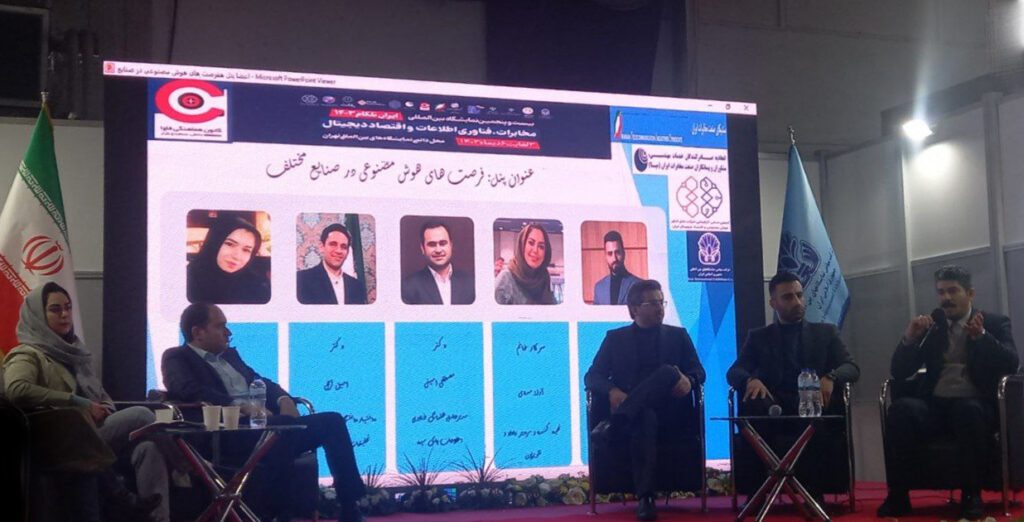The twenty-fifth exhibition International Telecommunications, Information Technology and Digital Economy was held with the slogan “Sustainable Communications in the Age of Artificial Intelligence”. On the sidelines of Telecom this year and in a panel called “Artificial Intelligence Opportunities in Different Industries”, a group of experts in the fields of finance, banking, health, insurance and media discussed the opportunities and challenges of artificial intelligence in different industries.
This panel was held with the presence of “Dr. Akbar Abedi”, “Dr. Mehdi Kaysari”, “Arash Borjikhani”, “Mahdi Moeini”, “Dr. Elham Ramezani” and “Arzo Madadi” and discussed various topics from the application of artificial intelligence in banking and health to Digital innovations in insurance and media were reviewed.
The role of artificial intelligence in the financial industry
At the beginning of the discussion, Dr. Akbar Abedi addressed the topic of the widespread entry of artificial intelligence into the financial industry. He explained: “This technology has been able to revolutionize financial services and create innovative ideas such as banking applications.” He mentioned things like analyzing customer behavior, providing personalized services and improving economic processes.
Dr. Abedi explained: “Technologies such as the Internet of Things and smart applications have directly affected the user experience and increased productivity.” He also pointed to challenges such as data security and the need for proper infrastructure that must be addressed in the future.
New applications of artificial intelligence in banking
Dr. Mehdi Qaysari, Sepeh Bank’s transformation and innovation manager, emphasized the importance of artificial intelligence in banking and explained the various applications of this technology. He stated: “One of the most important capabilities of artificial intelligence in this field is fraud prevention. “Artificial intelligence can identify unusual patterns in financial transactions and take preventive measures.”
Also, risk management in granting bank facilities is another important benefit of this technology. He cited data-driven models and predictive analytics that have improved the customer experience and made banking processes more efficient.
Transformation in health with artificial intelligence
Arash Borjikhani, a digital business development consultant in the healthcare industry, explored the profound impact of artificial intelligence on improving the quality of healthcare services. He pointed to tools such as image processing for disease diagnosis, wearable gadgets for continuous monitoring of vital signs, and the creation of electronic health records.
Borjikhani explained that these tools can improve access to medical services even in remote areas. He cited examples of startups that have been able to detect diseases such as diabetes or cancer in the early stages. He also emphasized the necessity of collecting and managing health data for further progress in this field.
The impact of artificial intelligence in insurance
Mehdi Moini, head of the Central Insurance Information Technology Committee, discussed the vital role of artificial intelligence in the insurance industry. He explained: “This technology can speed up insurance processes and increase their accuracy. For example, the analysis of customer data can lead to the design of accurate insurance policies tailored to their needs.”
He also mentioned the topic of risk management and emphasized: “Artificial intelligence can improve customer experience by predicting losses and reducing payment time.” He called for more efforts in the field of digitization and the use of artificial intelligence to prevent diseases and increase public health.
Media innovation with artificial intelligence
Arzu Madadi, producer and editor of radio and television, discussed the role of artificial intelligence in the media industry as a transformative tool. He stated: “This technology has been able to make the content creation process faster and more accurate. For example, artificial intelligence is able to analyze audience behavior and make suggestions for scheduling programs.”
He also mentioned the ability to personalize the content and provide specialized podcasts that allow the audience to access the content they want. Maddi believes: “This technology can make radio and television more powerful in the competition with digital platforms.”
Challenges and future horizons
In the end, all the speakers discussed the challenges and future horizons in the field of artificial intelligence. They emphasized the importance of creating proper infrastructure and investing in research and development. Also, the issue of data security and monitoring the use of this technology was among the issues that require serious attention. Despite these challenges, artificial intelligence has the potential to create great changes in various industries and can help improve the quality of life.
This panel was an opportunity for experts from different angles to examine the effects and potentials of artificial intelligence in different industries. As a transformative tool, artificial intelligence has tremendous capabilities in improving performance and creating value in these areas and can create a new path for sustainable development.
RCO NEWS


















